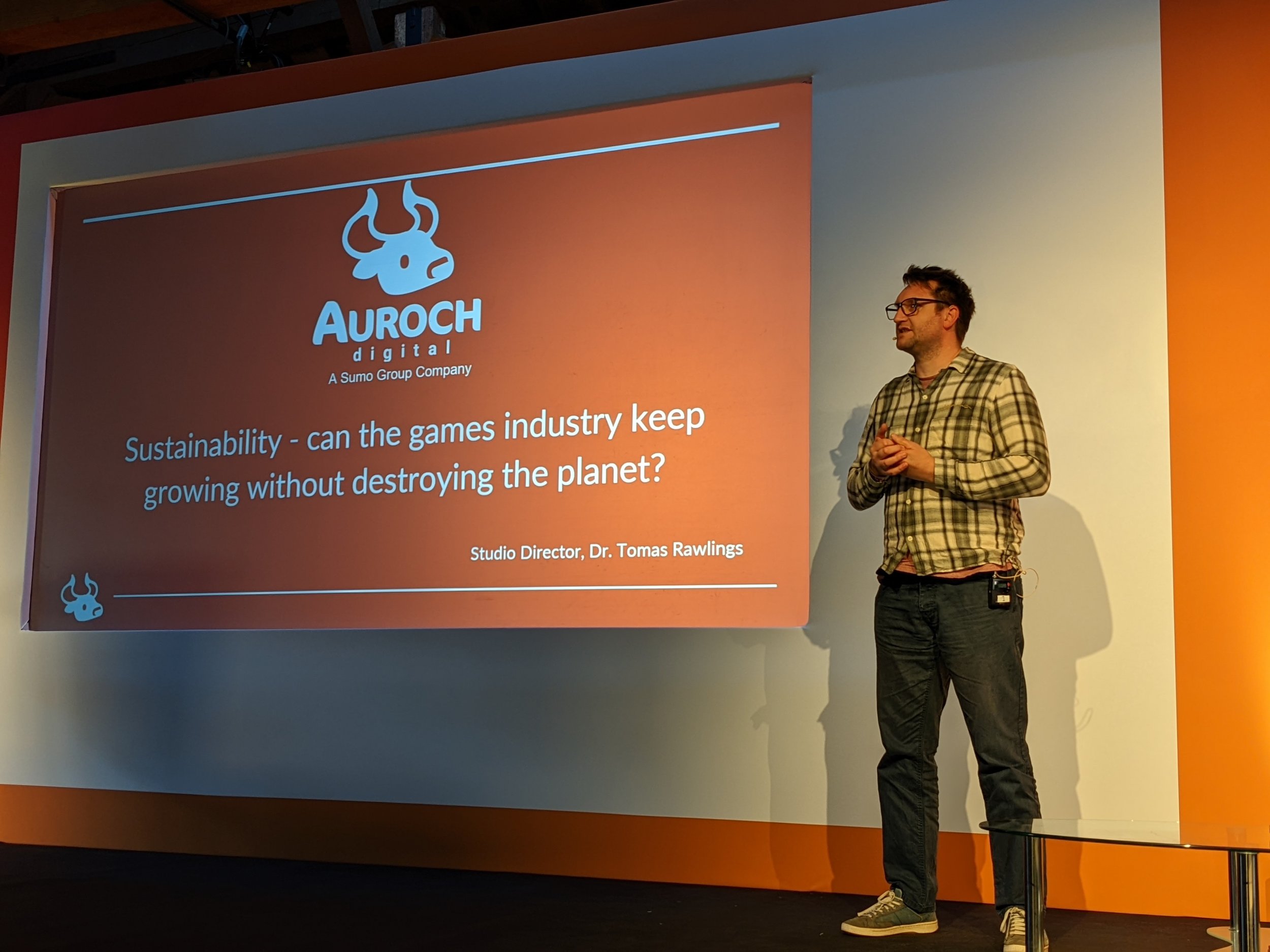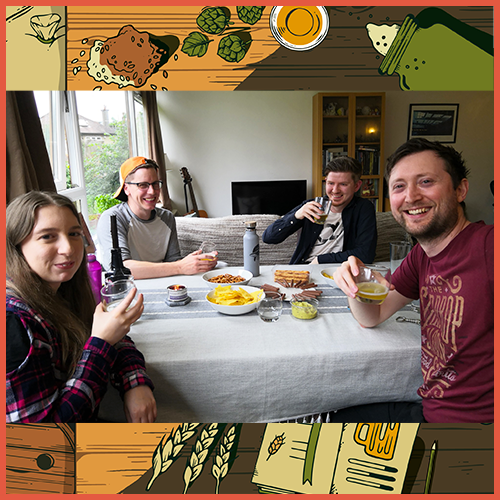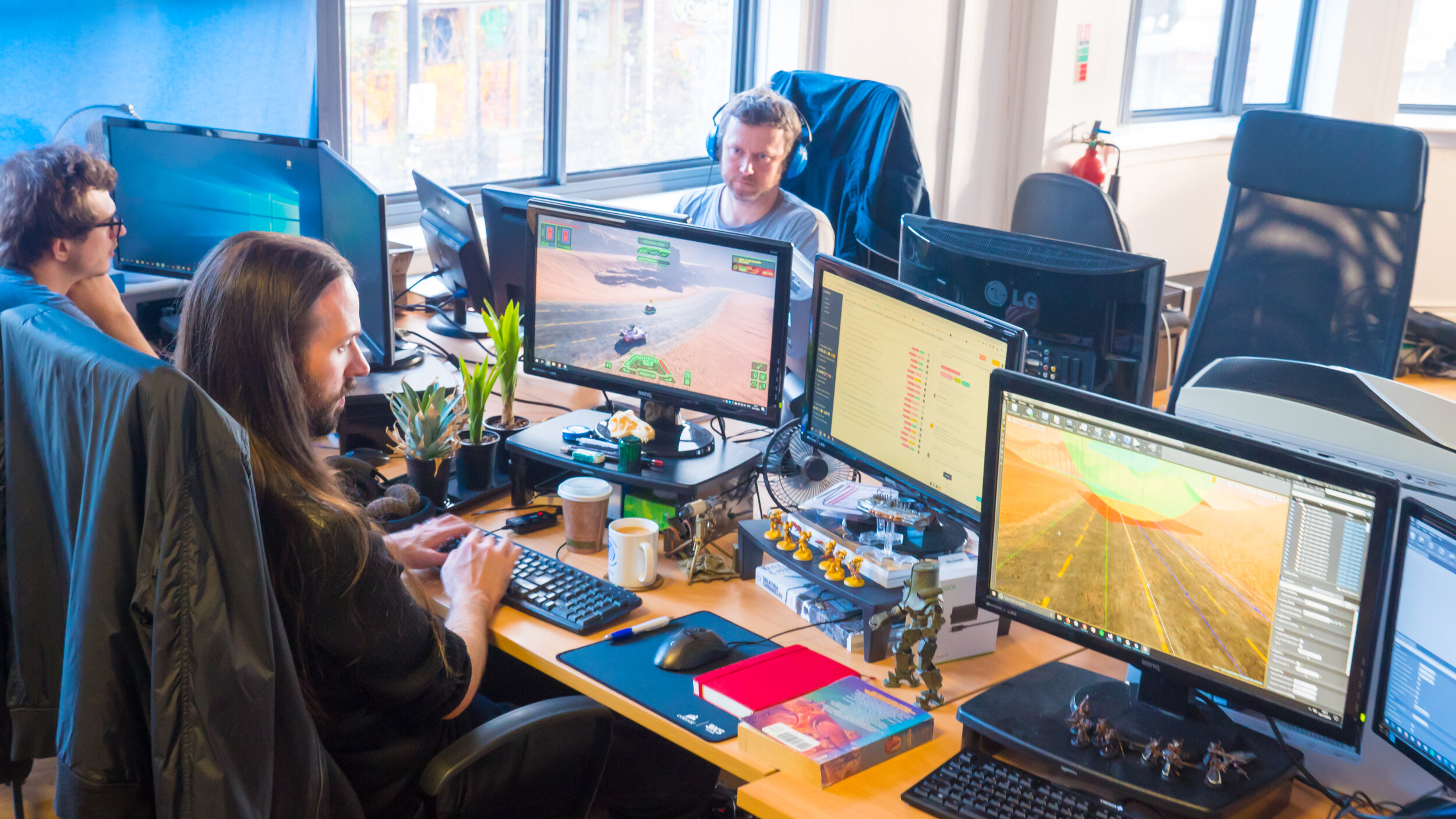How to get a job in video games
/Last updated: 10/09/2024
We often get people reaching out to us for advice on how to get into the game industry. It’s a great place to work - creating something you love and working with like-minded people. But it can be difficult to break into games and everyone seems to have a different path. For that reason, we’ve collected everyone’s experiences here at Auroch Digital to help you figure out how you might be able to get your start working in games.
First steps to take:
Decide what you want to do! Figure out if you want to get into programming, UX/UI, business development, production, marketing, journalism, or something else.
Take part in game jams! There are loads to choose from and you’ll get a chance to try out different roles. At the end of it you’ll also have a game that you can add to your portfolio.
Make a game! This can be daunting but there are loads of resources that will help you. It’s not as hard as it sounds, promise.
Get networking! We have lots of socials and events open to anyone at the Games Hub. There are similar communities all over. Come along and get to know people.
Sign up to newsletters! Game developers often use newsletters to reach out to their community, post jobs, but also discuss game ideas.
Practise your craft! You’ll only get better at writing, design, and coding by actually doing it. It will also help when applying for jobs if you can show what you can do.
Build a portfolio! Once you’ve got a few examples of your work pull them together into a portfolio to show off to potential employers. Don’t just tell them what you can do, show them.
Sign up to game job listings! Even if you’re not ready to apply yet, browsing jobs will show you what’s out there and what people are looking for. Two listings we can recommend are gamesindustry.biz and gamasutra.
Join Twitter! It is a great place to get an insight into the game industry. Hashtags like #gamedevjobs #gamejobs show you what people are looking for. You can also find loads of useful threads with games industry advice.
For an insight into what working at an indie game dev studio is like listen to our podcast episode “A day in the life of Auroch Digital”.
About Auroch Digital
Originally founded in 2010, Auroch Digital became a Sumo Digital studio in 2023. We are a remote-first game development studio with a base in Bristol, UK. We are the developers for Warhammer 40:000 Boltgun and Mars Horizon but we’ve also ported and published popular Steam titles and brought them to console. These include the storytelling RPG Wildermyth, the fishy theme park management game Megaquarium, cute robot city builder The Colonists, and the political sim strategy game Democracy 4.
Find out more about the people who work at Auroch Digital below!
Nina, Auroch Digital’s Studio Director
Nina (She/Her) - Studio Director at Auroch Digital
Nina was hired as the Office Manager in 2015 when there were only 12 of us. She then moved into production, going on to release Ogre and Acthung Cthulhu: Tactics, then branched into biz dev, pitching projects such as Brewmaster and Boltgun. This meant that Nina ended up in a position with experience across the breadth of the company and really enjoyed the plate spinning joy of helping to run the business. With hard work and the wonderful support of Auroch, she was promoted to Ops Director in 2021 when we were acquired by Sumo and then to Studio Director of Auroch Digital in 2024.
When asked ‘What is a piece of advice would you give yourself starting out?’ this is what Nina had to say “Just go for it, try your hand at everything, and see what your enjoy and are good at. “
Tomas (He/Him) - Vice President of Sumo Digital UK
Tom’s biggest piece of advice is to get as much experience working in teams as possible. You might be great at coding or art, but if you can’t work with a team of people then you won’t get on well at a game studio.
Tomas giving a talk at WASD about sustainability in gaming
Some good overall tips:
Don’t Spam studios with generic emails.
Studios get hundreds of spam emails daily so to get your message across, it needs to stand out. Make sure the subject is appropriate and relevant.
When asking for work experience make, don’t just talk about how it will be good for you, what will the studio gain?
Make sure to include in your request what the studio will gain. Remember that many studios are tiny and taking on someone for this role is a significant cost in time and resources.
Don’t turn your nose up at an offer because it’s not the exact role you want.
All experience counts and often the stuff that matters most is the core areas such as teamwork.
Got the interview? Make sure you are well prepared and research a lot.
Make sure you've researched the games of the company your going to an interview with and ideally played their games. If you want them to take an interest in you, then take an interest in them.
Tom has also written an article with advice for parents whose kids want to work in games. Give it a read here.
The Brewmaster team enjoy some beer research
Peter (He/Him) - Production Director
After Peter got his acting degree he started a podcast about retro gaming while working in retail. In his spare time, he wrote about and created videos about games for websites. He also topped up his CV by getting a job in live entertainment marketing. After building up enough contacts in the game industry, he was able to become a marketing, community, and section editor for a major game website, and eventually deputy editor. During this time, he realised that what he liked about games was seeing how they were made and getting the most out of a team, and so he got a job here at Auroch Digital.
“Get involved in games in whatever way you can. The things you'll learn by making and critiquing games, regardless of whether you're a professional or not, are incalculably valuable. Throw a story together in Twine, make a utility app in Unity, do an animation set for RPG Maker, make a Flappy Bird clone in Unreal... it's all going to be useful and shows that you genuinely have a passion for making stuff when it comes to a job interview.”
Aaron (He/Him) - Creative Director
Aaron studied cybernetics at university before getting a job for a few months as a game tester at Lionhead. He then went on to get an engineering job for about 6 years whilst still working on game modding projects in his free time. His experience modding games eventually landed him the chance to join an indie game studio.
“Only consider a career in games if you already find yourself spending lots of your free time working on games for the sheer joy of it.”
Jemima streaming Megaquarium at an aquarium in front of the shark tank
Jemima (She/Her) - Marketing and Comms Director
“I’m a game marketer because I love games, but also, and more importantly, because I love marketing. I started off doing marketing for the Institute of Physics, but when a role came up to do marketing for games, I jumped at the chance. Since then I’ve been able to get other roles in the game industry by asking someone if they knew of any roles going, and being told to sign up to a studio newsletter. Networking is important, both for getting support and finding out about opportunities and roles.
My advice is to give yourself as many opportunities as possible by getting to know people, signing up to newsletters, and following studios on socials. You never know which opportunity will turn out to be your lucky break.”
Sam (He/Him) - Principal Programmer
Sam started learning programming in his spare time while working another job. He spent years learning as well as making games in his spare time. During this time he was also getting involved in the Bristol games scene, did Games Jams, and networked. When the right role came along he was well prepared and had a good portfolio.
Matt (He/Him) - Principal Designer
“My two bits of advice: play a wide variety of games; try making a game in Unity or Unreal Engine to see which areas of development you're drawn to.”
Some of the Auroch Digital devs hard at work
Dan (He/Him) - Principal Artist
Dan got a Video Game Art degree and then worked as a teaching assistant on the same course. Following that he came to us here at Auroch Digital.
“I think the reality is that your grades and qualifications don't really matter, it comes down to your portfolio and the last bit of artwork you've done. Providing a solid portfolio and delivering a good art test will get you a job in opinion.”
Freddie (He/Him) - Associate Programmer
“Building a portfolio of personal projects/game jam games puts you in very good stead. As well as the experience, it gives you plenty to talk about in an interview to show off your passion! For programmers specifically, it's also great to talk about the latest or upcoming features in your preferred engine. If you can talk about your favourites and how you'd use them, it shows real initiative! Final piece of advice would be to not limit yourself, geographically speaking. There are so many game studios around the country and many of them will have remote working positions available.”
Joseph (He/Him) - Artist
“The process of applying for jobs in games can be challenging, it's important to remember that rejections are part of the process. Just because someone else got a job you wanted, doesn't mean you aren't good enough for it, they might simply have had more experience.
Soft skills are extremely valuable in a competitive field like video games. You have to assume everyone else applying for a role you want is as technically capable as you - so demonstrating other qualities like friendly openness, enthusiasm and self-confidence can be very important.”
Matthew (He/Him) - Senior Audio Designer
Matthew’s journey into games didn’t come by way of an application like most peoples, he was a freelancer. Did it for 7 years, built up a relationship with us and was kindly offered a role once our studio has reached a certain capacity.
Matt recording peter for the Auroch Digital Podcast
Have faith in your abilities
Build professional friendships / relations
Show more than a keen interest in what a studio is producing / working on / has shipped, introduce yourself to its circle
Reach out to like minded folk online [X (formerly Twitter) / Instagram are golden for this]
Post your work examples / portfolio online, but do not rely on this, when I was freelance I landed almost every gig by having attended a meetup of some sort
Don't sweat the small stuff, focus your energy on what you can change, drop the rest
Technical skill is of course important, but I'd put interpersonal skills above
Freelancing [whilst living on a knife edge], is actually a very good source for contact gathering, and builds a very grateful outlook and perspective
Lucy (She/Her) - Producer
“My advice is pretty simple.... You've just got to keep trying! Getting your foot in the door is the hardest part of getting into the games industry, but once you're in you'll find out we're a pretty tight knit community. Be prepared to face a lot of 'no' but once you get that 'yes' - even if its not your dream role - you should take the opportunity.”
Simon (He/Him) - Marketing Manager
“My main piece of advice for getting a career in games is to become part of a wider gaming community. Find a game or genre that you thoroughly enjoy and make connections through Discord channels, Reddit, or other social media sites. I have worked in marketing for over a decade, and it was through getting to know people this way that I was able to get my first role in video games. It’s not just something that can benefit your career but can help you meet like-minded people who make a long-lasting and positive impact on your life.”
Auroch Digital at the tough mudder finishing line
Eren (She/They) - Lead Artist
“Give everything that interests you a go and don’t limit yourself to start with, work out what you genuinely enjoy first. Build up your portfolio based on that enjoyment; it will be much easier to show your best work when you have fun with the process.
Remind yourself that everyone has their own pace and path into the industry, do not compare yourself to others and base your value on that, this can be especially hard at the beginning.
Get involved in mentoring, feedback and reaching out to others for advice. Not only will you improve yourself as a developer, but you will learn the interpersonal skills that are needed for working within a studio. Learning how to receive and give feedback can be hard but will massively help you in your career!”
Hannah (She/Her) - Associate Producer
“Talking about yourself and identifying your strengths can be a very tough process, so my top tip when pulling together your resume/portfolio is to try and think of yourself as you would think of a friend! We can be our own worst critiques, but think about the unique perspective and experiences you can bring to the table, and what skills you developed from them. As cheesy as it sounds, I think genuinely being your authentic self is so important too! If you are presenting an idealised version of yourself you may miss the chance to form genuine connections, or miss warning signs. We are all human, and have our own strengths, flaws, passions, and boundaries. There is also such value in a diversity of voices, so don't squish yours down to fit into a job!”









